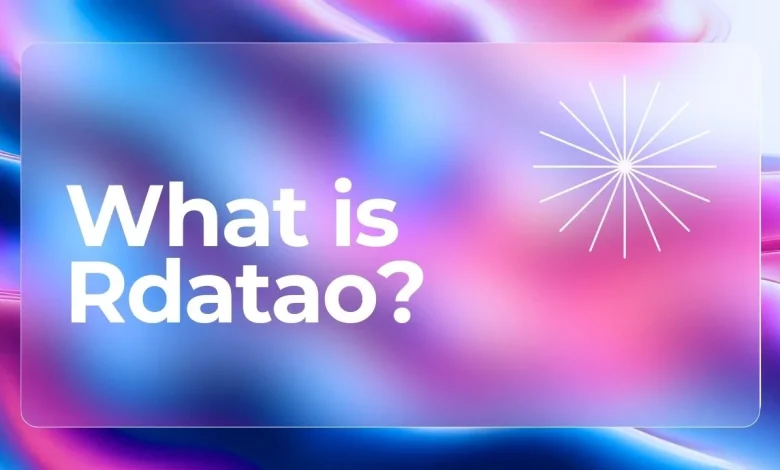What is Rdatao?

Rdatao is a cutting-edge data management platform designed to handle large volumes of data efficiently. It caters to organizations that need to store, process, and analyze vast amounts of information. The platform offers robust features for data collection, storage, and retrieval, making it a crucial tool in today’s data-driven world.
Businesses rely on Rdatao to make informed decisions based on accurate and timely data. The system is designed to be user-friendly, allowing even those with limited technical expertise to manage their data effectively. Whether for small businesses or large enterprises, Rdatao provides a reliable solution for managing critical data.
How Does Rdatao Work?
Rdatao works by integrating various data sources into a single, centralized system. This integration allows users to access and manage their data from one platform, simplifying the process of data management. Once data is collected, it is stored securely within Rdatao’s infrastructure.
The platform uses advanced algorithms to process and analyze the data, providing users with valuable insights that can help drive business decisions. Users can set up automated processes for data collection, ensuring that they have access to the most current information.
Rdatao also offers tools for data visualization, allowing users to create charts and graphs that make the data easier to understand and interpret.
What Are the Key Features of Rdatao?
Rdatao offers a variety of features that make it a powerful tool for data management. One of its primary features is its ability to handle large datasets efficiently. Whether the data comes from social media, customer transactions, or other sources, Rdatao can store and process it without compromising speed or accuracy.
Another key feature is its security protocols, which protect sensitive data from unauthorized access. The platform also offers real-time data processing, enabling users to receive and analyze data as it comes in. Additionally, Rdatao supports collaboration, allowing multiple users to access and work on the same data sets simultaneously. These features make Rdatao a versatile and indispensable tool for businesses of all sizes.
Who Can Benefit from Using Rdatao?
Rdatao is beneficial for a wide range of users, including businesses, researchers, and government agencies. For businesses, Rdatao offers a way to manage customer data, sales figures, and other vital information in a centralized system.
This centralization makes it easier for businesses to analyze trends and make informed decisions. Researchers can use Rdatao to collect and analyze data for studies and experiments, ensuring that they have access to accurate and up-to-date information.
Government agencies can benefit from Rdatao’s ability to handle large datasets, allowing them to manage public records and other important data efficiently. Essentially, anyone who needs to manage large amounts of data can benefit from using Rdatao.
What Are the Advantages of Using Rdatao?
There are several advantages to using Rdatao for data management. First, it offers a high level of scalability, meaning it can grow with your business. Whether you need to manage a small amount of data or a large, complex dataset, Rdatao can handle it.
Second, the platform’s security features ensure that your data is protected from unauthorized access and breaches. Rdatao also offers flexibility, allowing users to customize the platform to meet their specific needs.
Additionally, the platform provides real-time data processing and analysis, which can be crucial for businesses that need to make quick decisions. Lastly, Rdatao’s user-friendly interface makes it accessible to users of all technical skill levels.
Are There Any Drawbacks to Rdatao?
While Rdatao is a powerful tool, it does have some drawbacks. One potential issue is the cost. For small businesses or individuals, the expense of using Rdatao may be prohibitive, especially if they do not require all of the platform’s features.
Another drawback is the learning curve associated with the platform. Although Rdatao is designed to be user-friendly, it can still take some time for new users to become familiar with its various features and tools. Additionally, while Rdatao offers a high level of customization, this can sometimes lead to complexity, making it difficult for users to set up the system exactly as they need it.
Pros and Cons of Using Rdatao
| Pros | Cons |
|---|---|
| Handles large datasets efficiently | Can be expensive for small users |
| Strong security features | Steep learning curve for new users |
| Real-time data processing | Complexity in customization |
| Scalable for growing businesses | Requires ongoing maintenance |
| User-friendly interface | Internet-dependent |
How Does Rdatao Compare to Other Data Management Tools?
Rdatao stands out from other data management tools due to its combination of scalability, security, and user-friendliness. While other platforms may excel in one or two areas, Rdatao offers a balanced set of features that cater to a wide range of users.
Compared to traditional data management systems, Rdatao’s cloud-based approach provides greater flexibility and accessibility. Users can access their data from anywhere, at any time, without needing to be tied to a specific device or location.
In terms of security, Rdatao’s advanced encryption methods give it an edge over some of its competitors. Additionally, the platform’s real-time processing capabilities make it a more dynamic solution for businesses that need up-to-the-minute data insights.
What Industries Use Rdatao?
Rdatao is used across various industries, thanks to its versatility and robust feature set. In the retail industry, businesses use Rdatao to manage inventory, track customer behavior, and analyze sales data. In healthcare, Rdatao helps manage patient records, monitor treatment outcomes, and ensure data privacy. Financial institutions rely on Rdatao for managing transactions, analyzing market trends, and ensuring compliance with regulatory requirements.
The manufacturing industry uses Rdatao to monitor production processes, manage supply chains, and improve efficiency. Even in the public sector, government agencies use Rdatao to manage large datasets related to population statistics, public services, and more. Rdatao’s adaptability makes it a valuable tool in nearly any industry that relies on data.
What Does the Future Hold for Rdatao?
As technology continues to advance, Rdatao is poised to become even more integral to data management. Future developments may include enhanced artificial intelligence (AI) capabilities that enable the platform to analyze data more efficiently and provide deeper insights. There may also be advancements in data security, with even more robust encryption and protection measures.
As more businesses and industries adopt data-driven approaches, Rdatao is likely to expand its offerings to meet the growing demand. The platform may also integrate with other emerging technologies, such as the Internet of Things (IoT), to provide even more comprehensive data management solutions. The future of Rdatao looks promising as it continues to evolve to meet the needs of a data-driven world.
Conclusion
Rdatao is a comprehensive data management platform that offers a range of features to meet the needs of various users, from businesses to government agencies. Its ability to handle large datasets, coupled with strong security measures and real-time processing, makes it a powerful tool in the modern data landscape.
While there are some drawbacks, such as cost and complexity, the benefits of using Rdatao often outweigh these challenges. As data continues to play an increasingly important role in decision-making, Rdatao’s robust capabilities ensure that it remains a valuable resource for managing and analyzing information. With ongoing advancements and a commitment to user-friendly design, Rdatao is well-positioned to remain a leading data management solution in the years to come.




